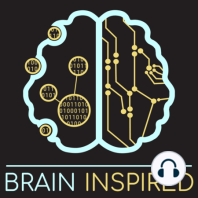105 min listen
BI 172 David Glanzman: Memory All The Way Down
FromBrain Inspired
ratings:
Length:
91 minutes
Released:
Aug 7, 2023
Format:
Podcast episode
Description
Support the show to get full episodes and join the Discord community.
David runs his lab at UCLA where he's also a distinguished professor. David used to believe what is currently the mainstream view, that our memories are stored in our synapses, those connections between our neurons. So as we learn, the synaptic connections strengthen and weaken until their just right, and that serves to preserve the memory. That's been the dominant view in neuroscience for decades, and is the fundamental principle that underlies basically all of deep learning in AI. But because of his own and others experiments, which he describes in this episode, David has come to the conclusion that memory must be stored not at the synapse, but in the nucleus of neurons, likely by some epigenetic mechanism mediated by RNA molecules. If this sounds familiar, I had Randy Gallistel on the the podcast on episode 126 to discuss similar ideas, and David discusses where he and Randy differ in their thoughts. This episode starts out pretty technical as David describes the series of experiments that changed his mind, but after that we broaden our discussion to a lot of the surrounding issues regarding whether and if his story about memory is true. And we discuss meta-issues like how old discarded ideas in science often find their way back, what it's like studying non-mainstream topic, including challenges trying to get funded for it, and so on.
David's Faculty Page.
Related papers
The central importance of nuclear mechanisms in the storage of memory.
David mentions Arc and virus-like transmission:
The Neuronal Gene Arc Encodes a Repurposed Retrotransposon Gag Protein that Mediates Intercellular RNA Transfer.
Structure of an Arc-ane virus-like capsid.
David mentions many of the ideas from the Pushing the Boundaries: Neuroscience, Cognition, and Life Symposium.
Related episodes:
BI 126 Randy Gallistel: Where Is the Engram?
BI 127 Tomás Ryan: Memory, Instinct, and Forgetting
David runs his lab at UCLA where he's also a distinguished professor. David used to believe what is currently the mainstream view, that our memories are stored in our synapses, those connections between our neurons. So as we learn, the synaptic connections strengthen and weaken until their just right, and that serves to preserve the memory. That's been the dominant view in neuroscience for decades, and is the fundamental principle that underlies basically all of deep learning in AI. But because of his own and others experiments, which he describes in this episode, David has come to the conclusion that memory must be stored not at the synapse, but in the nucleus of neurons, likely by some epigenetic mechanism mediated by RNA molecules. If this sounds familiar, I had Randy Gallistel on the the podcast on episode 126 to discuss similar ideas, and David discusses where he and Randy differ in their thoughts. This episode starts out pretty technical as David describes the series of experiments that changed his mind, but after that we broaden our discussion to a lot of the surrounding issues regarding whether and if his story about memory is true. And we discuss meta-issues like how old discarded ideas in science often find their way back, what it's like studying non-mainstream topic, including challenges trying to get funded for it, and so on.
David's Faculty Page.
Related papers
The central importance of nuclear mechanisms in the storage of memory.
David mentions Arc and virus-like transmission:
The Neuronal Gene Arc Encodes a Repurposed Retrotransposon Gag Protein that Mediates Intercellular RNA Transfer.
Structure of an Arc-ane virus-like capsid.
David mentions many of the ideas from the Pushing the Boundaries: Neuroscience, Cognition, and Life Symposium.
Related episodes:
BI 126 Randy Gallistel: Where Is the Engram?
BI 127 Tomás Ryan: Memory, Instinct, and Forgetting
Released:
Aug 7, 2023
Format:
Podcast episode
Titles in the series (99)
BI 101 Steve Potter: Motivating Brains In and Out of Dishes: Steve and I discuss his book, How to Motivate Your Students to Love Learning, which is both a memoir and a guide for teachers and students to optimize the learning experience for intrinsic motivation. Steve taught neuroscience and engineering courses whi by Brain Inspired
